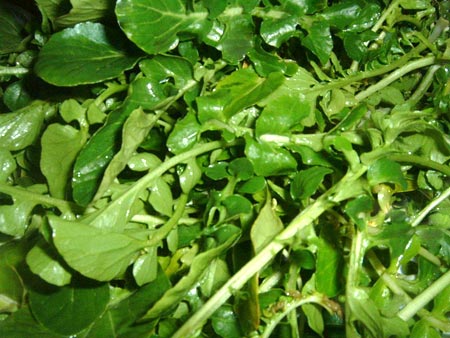 For centuries watercress was hailed and indeed annually confirmed the arrival of Ireland’s spring season, with rural people in particular collecting bunches of it to consume as part of their evening repast, believing that it would “clear the blood”. As a small boy in the 50’s, on Sundays, myself and my uncle Bill would make the walk of some three miles to collect this tasty peppery super-food from a fast locally flowing clear stream.
For centuries watercress was hailed and indeed annually confirmed the arrival of Ireland’s spring season, with rural people in particular collecting bunches of it to consume as part of their evening repast, believing that it would “clear the blood”. As a small boy in the 50’s, on Sundays, myself and my uncle Bill would make the walk of some three miles to collect this tasty peppery super-food from a fast locally flowing clear stream.
Although not a medical practitioner myself, watercress I was informed was rich in iron, vitamins and minerals (especially vitamin C, E and A). Back then, this incredibly versatile readily available free plant was packed raw into my home-made brown bread sandwiches, as a salad for school lunch breaks, and used in my home to make the occasional soup and sauce.
Today food science experts (which I repeat, I am not) talk about this herb reducing the risk of bladder, colon and rectum cancers, while also preventing breast cancer cells developing. Fact or fiction; most certainly watercress is being seriously scientifically investigated for its anti-cancer properties. Watercress juice is a natural antibiotic, and if applied to the skin, many claim it clears up spots, eczema, psoriasis and when eaten can speed up body detoxification, while relieving stomach upsets, respiratory problems and urinary tract infections. It is also suggested that uncooked watercress is a leading food source of quercetin, inhibiting xanthine oxidase, the enzyme that is responsible for converting purines into uric acid, thus placing watercress into a class of food suitable for those who suffer from painful gout.
The ancient Greek philosopher, historian, soldier and mercenary Xenophon (430–354 BC) insisted his soldiers eat specifically watercress “for vigour” before going into battle believing it could increase their mental powers. Hippocrates of Kos (460-370 BC) one of the most outstanding figures in the history of medicine and indeed referred to as the “Father of Modern Medicine”, set up his first hospital on the Greek island of Kos, beside a spring thus enabled him access to a continuous supply of watercress with which to treat patients.
The English botanist, herbalist, physician, and astrologer Nicholas Culpeper (1616 -1654) in his book “Complete Herbal” (1653) wrote “Watercress pottage is a good remedy to cleanse the blood in spring and consume the gross humours winter hath left behind”. So too can be found references to this super-food, watercress, in early Irish manuscripts. Watercress supposedly enabled St. Brendan to live to reach the ripe old age of 180, while Irish monks appear to have survived on it for long periods of time, referring to it as “the pure food of wise men”.
Then inevitable came the contamination scare in the 1970’s / 1980’s. Since watercress grows in streams inhabited by water snails; these snails can carry a nasty parasite known as liver fluke, spread by the run off from cattle and sheep and washed into our streams and rivers. Droplets of water and these tiny snails, who cling unto watercress leaves, can pass-on this parasite to humans.
Of course the best way to make sure you don’t contract this parasite is to blanch your watercress briefly at high temperature. In undertaking this most simple of exercises, the threat of liver fluke parasite is eradicated. Perhaps also the introduction and ready availability of lettuce all year round was considered to be now less of a food risk and watercress went mostly forgotten.
Over recent years watercress is once again back on the menu and thankfully sold commercially through our supermarkets here in Thurles and elsewhere. But here is a test, grab four slices of low-G.I. brown bread (Available most days in Thurles Supermarkets) made with linseed, jumbo oats, sunflower and pumpkin seeds, then make two sandwiches filled with red cheddar cheese and strong helpings of watercress. Once lightly toasted and consumed, I dare you to come back and tell me you did not get a feeling of wellness and vigour, after your simple delicious meal.
Do any farmers grow watercress in Co. Tipperary; I don’t believe so. Perhaps such a happening could be a future addition to the home of excellent food production, while offering at least some limited rural employment.

Leave a Reply